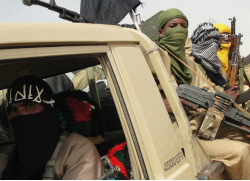
After a plea from Mali’s interim president, Dioncounda Traoré, French troops were sent in last Thursday to help combat an Islamic group, closely associated with Al Qaeda, that has taken over parts of Northern Mali. The group has instituted Shariah Law in the region, dealing out harsh punishments such as hand and feet amputations, whippings, and even in one reported case, the stoning of a couple who was accused of having children out of wedlock. The police chief cut off his own brother’s hand as his brother was strapped to a chair, stating “[w]e had no choice but to practice the justice of God.” Despite international threats and the United Nations Security Council approval to initiate a military campaign to drive out the group, these rebels seem undeterred.
Mali, originally a French territory, gained its independence in 1960 and held its first democratic election in 1992. The country, however, has faced turmoil over the years resulting in government coups. The Islamic extremist are just the last in a line of those who have gained power, taking over two –thirds of northern Mali last year.
The U.N.-approved plan originally involved a retrained Mali army, backed by African troops from the Economic Community of West African states, entering the region and retaking the area. The European Union was to help train the troops and France was to serve as a guide, with the United States providing intelligence and airborne reconnaissance. The plan, however, has been slow to commence. France was never intended to be involved in the actual fighting, but the situation seems to have changed. The French president took sudden action by sending in troops on Thursday. The action was meant to be a “sudden blow” to the rebels and a short-lived involvement. Instead, it has turned into a “drawn-out military and diplomatic operation.” When asked about France’s unexpected involvement, a French official stated that the alternative is “another Somalia.”
The African countries that committed troops are finding it difficult to get their operations off the ground. Many believe that France’s action will stimulate the slow process and force European and African countries to move at a faster pace. However, others are asking why France took such action in the first place.
Despite some criticism, the entire African region supports the involvement along with various European countries. David Cameron, Prime Minster of the United Kingdom, stated on Friday that “those who believe that there is a terrorist, extremist Al Qaeda problem in parts of North Africa, but that it is a problem for those places and we can somehow back off and ignore it, are profoundly wrong.”
Lina Jasinskaite is a 3L at the University of Denver, Sturm College of Law and a staff editor at the Denver Journal of International Law and Policy.

